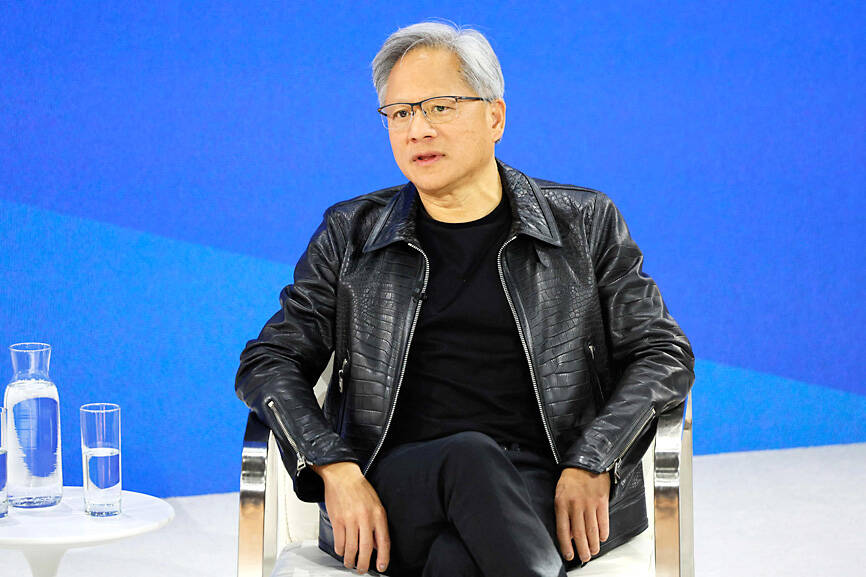Nvidia Corp CEO Jensen Huang (黃仁勳), who runs the semiconductor industry’s most valuable company, said the US is as much as 20 years away from breaking its dependence on overseas chipmaking.
Huang, speaking at the New York Times’ DealBook conference in New York on Wednesday, explained how his company’s products rely on myriad components that come from different parts of the world — not just Taiwan, where the most important elements are manufactured.
“We are somewhere between a decade and two decades away from supply chain independence,” he said. “It’s not a really practical thing for a decade or two.”

Photo: AFP
The outlook suggests there is a long road ahead for a key US President Joe Biden administration objective — bringing more of the chipmaking industry to US shores.
Biden has championed bipartisan legislation to support the building of manufacturing facilities in the US, and many of the biggest companies are planning to expand their US operations. That includes Taiwan Semiconductor Manufacturing Co (台積電), Nvidia’s top manufacturing partner, as well as Samsung Electronics Co and Intel Corp.
Europe is also pushing to build more manufacturing locally. It is part of an attempt to roll back decades of globalization that has scattered production across the world, but has also led to chokepoints in areas such as Taiwan and South Korea.
Separately, Huang reaffirmed his company’s commitment to China — still the largest market for chips. The company lost the ability to sell its most powerful artificial intelligence (AI) processors to the country after the US government imposed export restrictions, and then further tightened them last month. Washington believes that such steps are needed to protect national security.
Following the announcement of the latest rules, Nvidia is working on products for China that will not trigger restrictions, Huang said.
“We have to come up with new chips that comply with the regulation, and once we comply with the regulation, we’ll go back to China,” he said. “We try to do business with everybody we can. On the other hand, our national security matters. Our national competitiveness matters.”
He also cautioned against the unintended consequences of such rules. There are as many as 50 companies in China that are now working on technology that would compete with Nvidia’s offerings, he said.
Meanwhile, Huang said at the conference that artificial general intelligence (AGI) would be “fairly competitive” with humans in as few as five years.
When asked if AGI could be achieved in 10 years, Huang said it could happen even sooner.
“Depending on how you define it, I think the answer is yes,” Huang said. “If we define AGI as a piece of software — a computer that can take a whole bunch of tests and these tests reflect basic intelligence — and by completing those tests deliver results fairly competitive to a normal human, I would say that within the next five years, you can see AIs that can achieve those tests.”

Semiconductor business between Taiwan and the US is a “win-win” model for both sides given the high level of complementarity, the government said yesterday responding to tariff threats from US President Donald Trump. Home to the world’s largest contract chipmaker, Taiwan Semiconductor Manufacturing Co (TSMC, 台積電), Taiwan is a key link in the global technology supply chain for companies such as Apple Inc and Nvidia Corp. Trump said on Monday he plans to impose tariffs on imported chips, pharmaceuticals and steel in an effort to get the producers to make them in the US. “Taiwan and the US semiconductor and other technology industries

SMALL AND EFFICIENT: The Chinese AI app’s initial success has spurred worries in the US that its tech giants’ massive AI spending needs re-evaluation, a market strategist said Chinese artificial intelligence (AI) start-up DeepSeek’s (深度求索) eponymous AI assistant rocketed to the top of Apple Inc’s iPhone download charts, stirring doubts in Silicon Valley about the strength of the US’ technological dominance. The app’s underlying AI model is widely seen as competitive with OpenAI and Meta Platforms Inc’s latest. Its claim that it cost much less to train and develop triggered share moves across Asia’s supply chain. Chinese tech firms linked to DeepSeek, such as Iflytek Co (科大訊飛), surged yesterday, while chipmaking tool makers like Advantest Corp slumped on the potential threat to demand for Nvidia Corp’s AI accelerators. US stock

The US Federal Reserve is expected to announce a pause in rate cuts on Wednesday, as policymakers look to continue tackling inflation under close and vocal scrutiny from US President Donald Trump. The Fed cut its key lending rate by a full percentage point in the final four months of last year and indicated it would move more cautiously going forward amid an uptick in inflation away from its long-term target of 2 percent. “I think they will do nothing, and I think they should do nothing,” Federal Reserve Bank of St Louis former president Jim Bullard said. “I think the

SUBSIDIES: The nominee for commerce secretary indicated the Trump administration wants to put its stamp on the plan, but not unravel it entirely US President Donald Trump’s pick to lead the agency in charge of a US$52 billion semiconductor subsidy program declined to give it unqualified support, raising questions about the disbursement of funds to companies like Intel Corp and Taiwan Semiconductor Manufacturing Co (台積電). “I can’t say that I can honor something I haven’t read,” Howard Lutnick, Trump’s nominee for commerce secretary, said of the binding CHIPS and Science Act awards in a confirmation hearing on Wednesday. “To the extent monies have been disbursed, I would commit to rigorously enforcing documents that have been signed by those companies to make sure we get